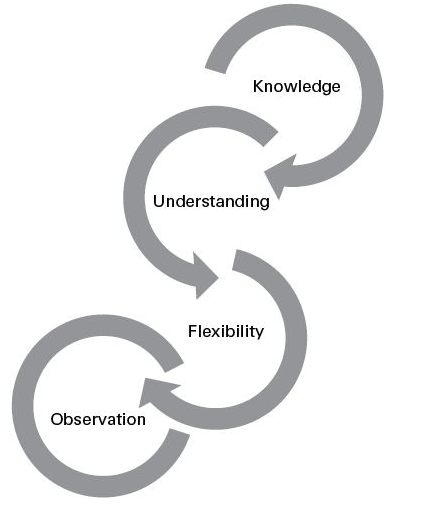
In the first two blog posts in this series on Enterprise Change Management(ECM) we took a look at:
Blog 1 - A definition of Enterprise Change Management
Blog 2 - Change Maturity – effectively baselining your Enterprise Change Management strategy
In this 3rd blog post we consider the importance of an adaptive leadership approach in your Enterprise Change Management strategy and as you progress on your ECM journey.
As a starting point we take inspiration from a highly relevant leadership study from the Armed forces which identifies some core facets of information, events and circumstances that corporate leaders can learn from about adaptive leadership.
What we can learn from leadership studies in the Armed Forces
The Armed Forces have been in the business of leadership development much longer than the corporate world has - latterly in terms of building a culture of readiness and commitment to face a fast changing and unpredictable type of enemy.
Leonard Wong, a Research Professor of Military Strategy (Human and Organizational Dimensions) at the Strategic Studies Institute at the US Army War College, wrote about:
Adaptive leaders being recognized by their ability to live with unpredictability, spend less time fretting about their inability to establish a routine or control the future, and focus more on exploiting opportunities [and, citing Warren Bennis]: adaptive leaders struggling with defining experiences but still being able to work through them quickly and intelligently to succeed.
You can read more on this study here.
These defining experiences are very characteristic of the change environments we typically face inside organizations, with:
- equal measures of opportunity and test
- complex work environments and overwhelmed employees
In this post we will try to codify the capacity that these adaptive leaders have to successfully navigate a complex ‘reality on the ground’.
4 key core leadership attributes of adaptive leaders
This ‘reality on the ground’ for a combat leader is a complex mix (as we’ve tried to capture below) of gathering new information, learning from past events, acquiring new skills and processing new circumstances. If they are going to be ‘battle ready’ and make the best command decisions.

- Knowledge of tactics, techniques, the enemy, the regiment, recent events, the environment, geography, terrain and more, is the frame of reference from which to plan and act.
- Thorough, clear understanding of the mission and commander’s intent builds focus and commitment.
- The flexibility to adapt one’s leadership and communication style to effectively reach, motivate and build trust among soldiers in the regiment is crucial for success.
- Learning by observation of results adds to the command repertoire and continues to build the depth and breadth of combat experience and knowledge
These core attributes are also very evident in the corporate world – and highly relevant as you look to develop an Enterprise Change Management strategy and capacity in your organization. They appear to be the product of two building blocks which we observe successful change leaders to be reliant on during major change:
- on a personal level of change resilience, executives own in-built coping mechanisms during change;
- a set of beliefs that these leaders hold about what makes change successful. These beliefs usually build up over a period of time and are based on experience.
Together these elements form a framework for adaptive change leadership.
You can read more about this in Chapter 6 of our book, Enterprise Change Management – How to prepare your organization for continuous change. Also, if you would like to get a flavor for the book, then you can download a free copy of Chapter 1 here.
Adaptive change leadership behavior’s we see in an organizational context
So how is this relevant in an organizational context and what type of behaviors do we see in this type of context?
In our work with clients we typically observe the following 6 critical behaviors from adaptive leaders in organizations:
- They engender tremendous focus on particular changes
Successful change leaders tend to initiate and lead fewer initiatives than their less successful counterparts and ensure that the organization is focused on their agenda. They seem to focus as much, if not more, on helping people to understand the potential cost of failure (COF) as they do on articulating benefits and outcomes associated with a future state.
- They delay implementation as necessary
Good leaders delay implementation until a common picture is built among key decision makers about the purpose of the change, the consequences of not changing, the solution and how the change is expected to impact the organization’s business model.
Basically, adaptive leaders understand that change begins with a clear reason and a belief that ‘we can’t afford to stay where we are’.
- They personally lead the implementation
The most successful change leaders we have seen in action are the ones who take on the change as a personal crusade or mission. They relentlessly pursue the objective – pick the few critical things that yield most value, and are like a terrier with them – all the time, everywhere. They don’t let go, and they refuse to be side-tracked.
- They act as if their own personal behavior is critical for change success
Most significant changes require a different way of working for people. Poor implementers believe that changes are in themselves a ‘magic bullet’ that will ‘force’ people to change, or they believe that people are so adaptable that they can make the transition without assistance. In contrast, good leaders acknowledge that information dissemination, training, rewards and leadership behavior usually need to be consciously adapted to ensure success.
- They understand that change is a contact support
People change by making contact with other people, discussing ideas, realizing that leaders are totally committed. This cannot be achieved by e-mail or web-based methods alone. It requires committed sponsors and change agents to be in the field, getting people to participate, persuading them of the change criticality, rewarding success and if necessary, given the importance of the change, eventually replacing those who are unwilling and/or unable to make the change.
Adaptive leaders see this contact as crucial to success. They know that implementation needs to be systematic and relentless in the engagement of people.
- They see it as their responsibility to build adaptive change capacity in their organizations
Conscious or unconscious decisions on recruitment, promotion, development and energizing people in the organization drives change capacity.
The desired outcome for adaptive leaders is that the organization has the ‘building blocks’ in place to enable widespread adaptation or transformation of people’s behavior. And that people can approach a portfolio of major change projects with confidence.
Some closing thoughts
So much has been written over the years about the ineffectiveness of change leadership that the focus of helping organizations navigate enterprise-wide change is guiding and supporting leaders towards new behaviors and mindsets.
Rather than continuing to commiserate about change leaders contributing to change failure, we have taken time in this blog to consider what they would be doing to develop Enterprise Change Management capability in their organizations.
Of course, high levels of personal adaptability, systematic change beliefs and focused leadership behaviors are not the panacea; they need to be used in conjunction with analyzing the requirements of the change, the history of change in your organization and capabilities described in other chapters. However, given the transformational nature of our current change realities, adaptive leadership is what is needed to create the engine to allow organizations to make bigger leaps, associated with windows of opportunity that are coming at us faster and staying open for a shorter time.
Take a more Agile approach to Change Management in your organization with Roadmap Pro
 |
|



Leave a comment